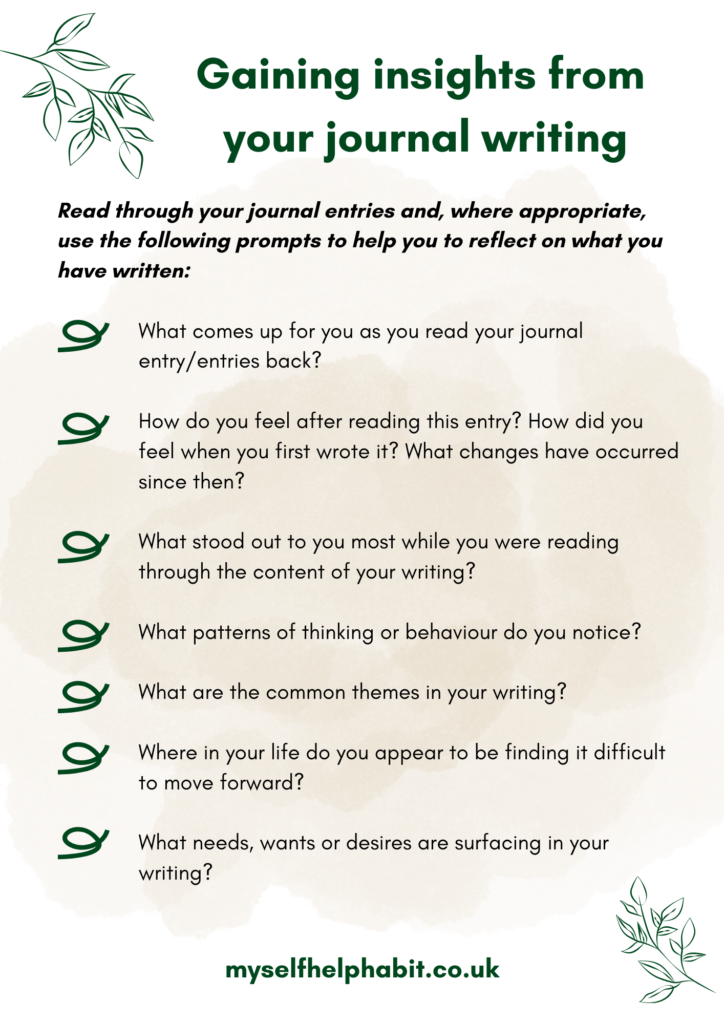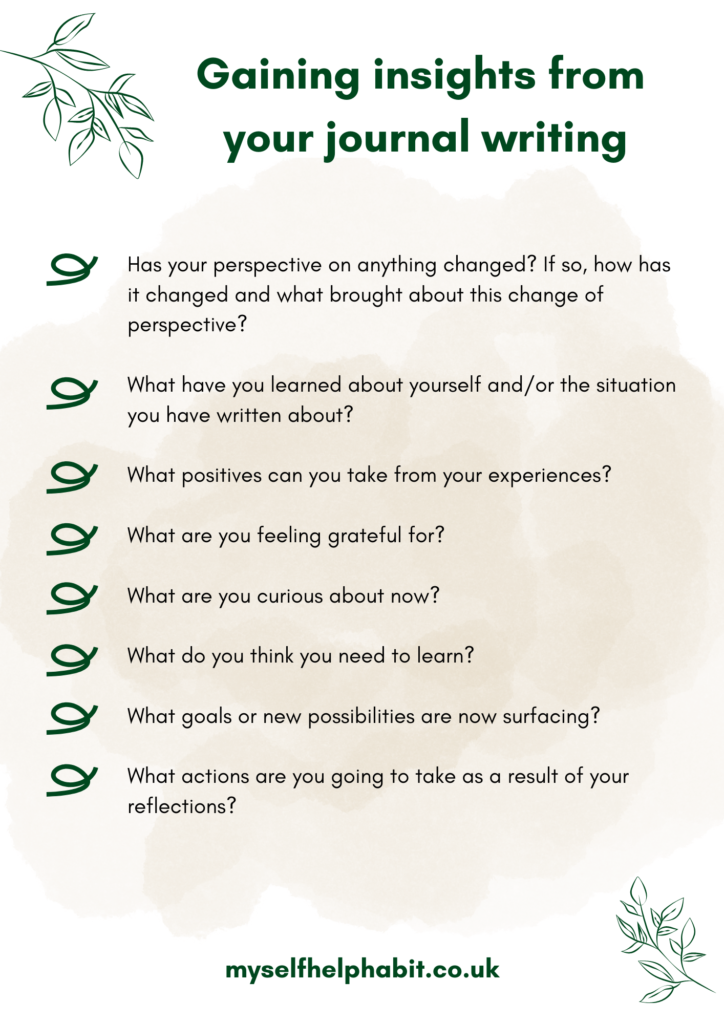
Gaining insights from your journal writing
If you have ever kept a journal you will know that it can provide a rare space in your life where you can just ‘be’, away from all the noise and distraction of daily life (and the influence of others!) Within the pages of your journal you can be open and honest about how you are feeling, entertain your latest creative ideas, explore new directions for your business or career, and work through your problems. It is the most attentive listener and will never wade in and try to persuade, advise, or judge you.
Combined with coaching, and talking things over with people in my support network, I have found journaling to be an incredibly effective personal development tool!
There is likely to be a multitude of personal insights and life lessons just waiting to be discovered amongst all the musing, dreaming and venting that goes on in a journal. Your writing may reveal the things that you really value and cherish and want to make more space for, it could highlight reoccurring issues that need addressing, and give you the motivation to make some positive changes in your life. As you read back over your writing you may be able to find meaning in the experiences you have had, understand yourself better, appreciate how much you have grown, and use any newfound awareness that you have gained to make decisions and set exciting new goals for yourself.
Read on to find out when and how to reflect on your journal writing. Then, dig out your journal/s and download the accompanying journal prompts at the end of this post. The prompts will help you to consider the experiences you have written about (as well as looking at the way you have written about them) and enable you to give some thought to what you have learned and what actions you could take based on the reflection you have done.
When should you reflect on your journal writing?
It really is up to you! However, you might find it helpful to take some time away from your writing first and then come back to it once you have had some distance and can look at your experiences more objectively. If you are feeling upset, irritable or down then looking back over entries, particularly the more difficult ones, may make you feel worse. So, whenever you decide to reflect on your journal entries, try to do it when you are in a balanced mood and are able to be kind to yourself. Also, remember that you can step away from your journal at any time!
Do what you need to do to get yourself into a resourceful state of mind, where you feel calm and able to work through issues and think about different ways forward. Depending on how you are feeling, you may also want to consider doing some self-care activities after writing up your reflections.
Here are some times when reflecting on your journal writing may serve you well:
- After writing a journal entry – If you feel able to, you could do your reflection straight after writing your journal entry (if needed, take a few minutes to do a calming breathing exercise and centre yourself first). Write about what you notice as you read back over your entry, note down what you think you could do differently and any actions that you would like to take forward.
- At the beginning or end of the year – You could read back through your journal as a matter of course during your end of year reflections. If you are a prolific journal writer (like me!) that may mean going through reams of paper so I would recommend just picking out and reading the entries that you think are going to be most helpful for you to reflect on.
- When you come to the end of your journal – before you pack your journal away and start a new one (and possibly forget about all the gems of wisdom and personal growth that lay inside!) you could leave the last couples of pages for some reflection on what you have written.
- During a transition in your life – I have found looking back over my journal entries particularly insightful when I have been engaging in some self-discovery and exploring what I really want from my life and where I should go next in my career.
- To facilitate goal setting or decision making – Your journal entries may point you to areas of satisfaction or dissatisfaction in your life and help you to build upon what is already working well and create goals that will address the issues that you are experiencing. If you are at a crossroads, reflecting on the experiences that you have written about in your journal may help to clarify your thoughts and reveal what path would be the best one to take.
How to reflect on your journal writing
Firstly, think about your reasons for wanting to do this reflection.
- Which journal entries would you like to focus on and why?
- What would you like to get out of the experience?
Once you are clear on why you want to do some reflection and which journal entries you are going to revisit, pick a time in your schedule when you are unlikely to be disturbed. Cosy up with your favourite drink/snack, take out your journal and look back over the entries you have made. Grab a highlighter pen and, as you read, mark any passages that you think are significant. You could also make a quick note in the margin to explain why you have marked the passage if it will help to jog your memory when you come back to it. You could look out for evidence of your:
- Core values
- Strengths
- Common thinking distortions
- Patterns of behaviour
- Issues that keep occurring in your life
- Limiting beliefs about yourself or the world
- Achievements and things that are working well for you
As stated earlier, it is important to read and reflect on your journal entries from a place of compassion. Try to recognise when the voice of your inner critic suddenly appears or any negativity bias creeps in and tune right back into your inner coach! You could also imagine that it’s a good friend or someone you love dearly who is experiencing the issue you have written about and then consider how you would respond to them and what you might say.
Ultimately, focus on the learning that you have gained and how much you are growing as you navigate life’s ups and down. You could also note down what you feel grateful for as you look back over your entries (for example, any good times, small things that made you smile, friends and loved ones who have supported you, etc.) and list any other positives that you can take away from your experiences.
If you are having problems with looking at a past situation more objectively or would like another perspective (and feel comfortable doing so) you could ask a trusted friend or a coach/counsellor/therapist to listen while you read out what you have written or see if they can read through your extract/s. You can then ask them for their thoughts and observations or what questions they think you could ask yourself.
Prompts to help you to reflect on your journal writing
Ready for some reflection time? Download the journal prompts, look back over your journal entries, and write down your answers to the questions that are most relevant to you.
Book a FREE coaching session
Thinking about making some changes in your personal life or career but don’t know where to start?
How about giving yourself some space to talk things through, clarify your thoughts and map out the steps that will take you forward?
I am currently offering one 90-minute, introductory coaching session for FREE to all new and prospective clients. If you are curious about how coaching could benefit you and would like to take up this offer then head over to my coaching services page. Simply complete the coaching enquiry form and I will be in contact with you to arrange our first session.






